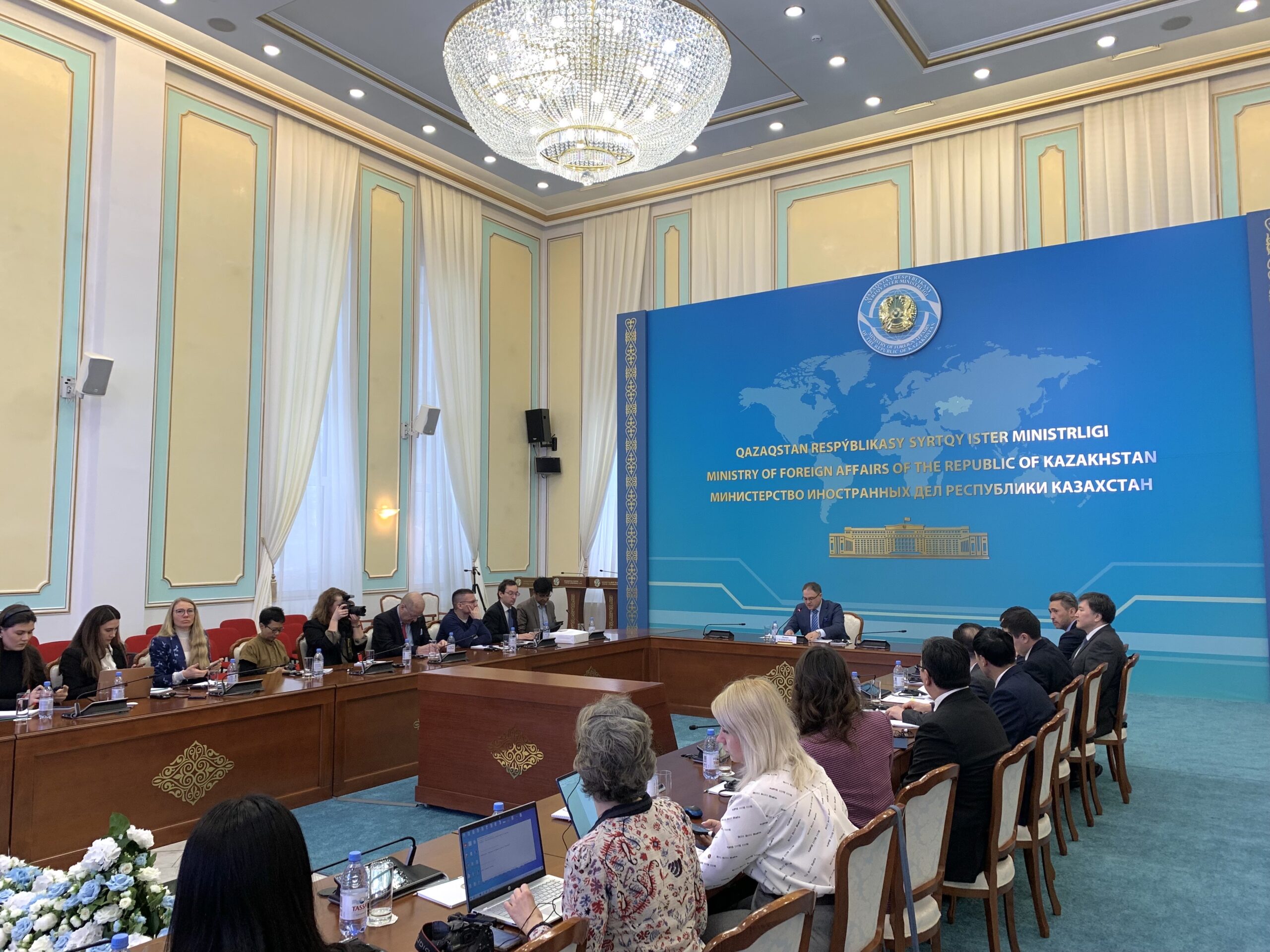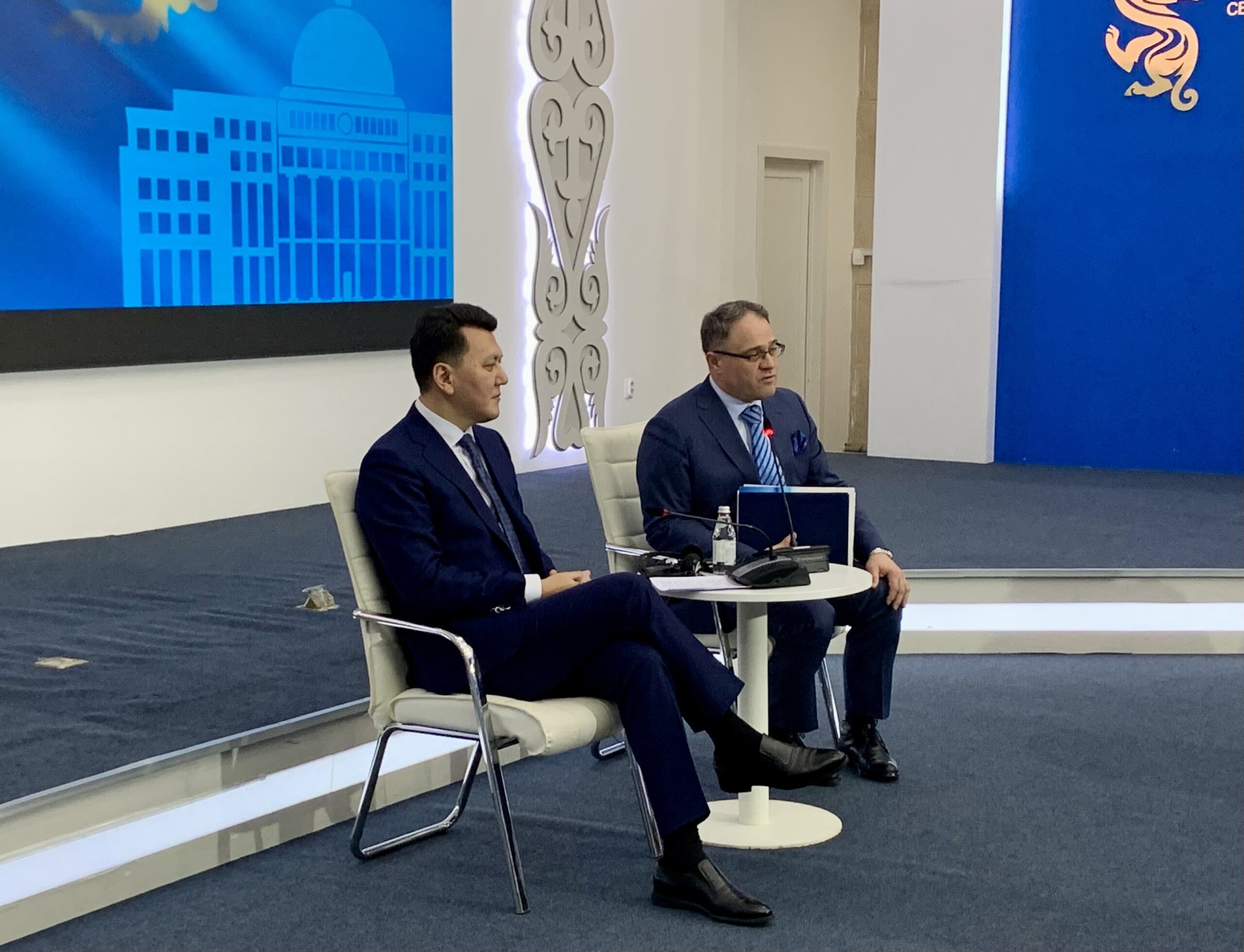ASTANA — State Counselor Erlan Karin and Deputy Foreign Minister Roman Vassilenko spoke about the major features and changes in the upcoming March 19 parliamentary election and its significance for Kazakhstan’s political development with the foreign reporters in Astana on March 16.

Deputy Foreign Minister Roman Vassilenko spoke to foreign media representatives on March 16. Photo credit: The Astana Times.
With the country undergoing transformative political reforms and electoral cycle, one could not have imagined how far Kazakhstan would progress in just over a year, said Vassilenko.
“From a political perspective, our political processes are unrecognizable compared to what they were just over 12 months ago. Today, Kazakhstan has truly become a land of change,” he said.
“Despite the challenges we faced in January last year, we have managed to implement transformative reforms and amend our Constitution for the benefit of our country and people,” added Vassilenko.
The upcoming election will be notable as it will complete the reset of Kazakhstan’s political cycle.
“Ultimately, these elections are meant to allow us to accelerate our national renewal – with a refreshed democratic mandate for inclusive and expansive reform,” said Vassilenko.
According to him, President Kassym-Jomart Tokayev’s reforms, including those related to the elections, “serve as a solid foundation for creating a truly multi-party system, helping implement effective oversight mechanisms and enhance accountability across different levels of the Kazakh government.”

State Counselor Erlan Karin and Deputy Foreign Minister Roman Vassilenko at a Central Communications Service briefing with foreign journalists. Photo credit: The Astana Times.
Vassilenko also stressed the importance of involving the Kazakh citizens in the political processes. “The people of our country are at the heart of this process and will remain so going forward. We want our citizens to continue to be involved in the political processes. This is the essence of a listening state — a concept proposed by President Tokayev in 2019 to ensure that government officials hear and respond to citizens’ requests and concerns,” he said.
He also took the opportunity to invite journalists to the upcoming Astana International Forum (AIF) on June 8-9 in Astana. He highlighted it would address key global geopolitical issues and cover middle power diplomacy, global supply chains, energy security and a green transition, among others.
In the afternoon, foreign media representatives met with State Counselor Karin. He highlighted the fact that their meeting marked exactly a year since President Tokayev’s address to the nation on March 16, in which he proposed comprehensive political reforms.
He said the goal of such reforms was to establish an optimal balance between the institutions of power to increase openness and transparency in the political process and increase citizens’ participation in decision-making and public dialogue.
Speaking on the objectives of the constitutional reform, Karin highlighted five key areas — the transition from a super-presidential to a presidential republic, redistribution of powers, changing the role and the status of parliament, increasing public participation in the governance of the country, and strengthening the mechanisms for human rights protection.
“I am confident that these elections would provide a transformation of the political model of the country into a new model,” said Karin.
“Not only are changes being made to the law on elections and party lists, but also amendments are being introduced regarding the interaction between the state authorities in accordance with the changes implemented in the Constitution. The authority of the parliament is being enhanced. For instance, if previously the Senate [the upper chamber of Kazakh parliament] was the one to adopt the laws, it is now Mazhilis, the lower chamber of Parliament, that will be doing so,” he said.
Public support and interest in the upcoming election has grown, with seven parties representing a much wider political spectrum, including left-wing and right-wing, centrists, environmentalists, oppositionists, and the so-called new force, according to Karin.
Previously, Kazakhstan has had what Karin calls a “1.5 party system” with one dominant party and several smaller parties.
Under the new system, more parties have an opportunity to increase their voice in the political decision-making process regardless of the percentage of the vote they take.
“Earlier, the President proposed to adopt a law on the parliamentary opposition to guarantee parties with the least votes to provide certain positions in the parliament. The parties with the fewest votes will be given the various committee chair positions so they would have a certain impact,” said Karin.
He noted that parties that will designate themselves as the opposition party will have the right to сall for parliamentary hearings, schedule the government hours, and propose topics for the next discussions.
“This is the first time we have an opposition party in the party race,” said Karin. “The National Social Democratic Party did not participate and boycotted the previous parliamentary election. But this time, they decided to take part, which is another fact that makes this election different,” said Karin.
A notable change in this election will be a 30 percent quota for women, youth, and persons with disabilities both in the party lists and during the distribution of mandates.
In 2020, a norm was introduced that obliged political parties to ensure at least 30 percent of people in their party lists are women and youth, which was applied for the first time in the 2021 election.
Last year the President proposed to introduce an obligatory quota that would apply to the distribution of seats as well.
“We have looked at the previous elections and the composition of all maslikhats [the local representative bodies], and it turned out that the proportion of women was only around three percent. The proportion of young people was even smaller, accounting for around 0.08 percent,” said Karin.
“We have quite a young country, there are many active young citizens. Most of the parties seemed to always advocate for gender equality, talking about supporting women and youth, but in practice, they [women and youth] did not get access to the tribunes of the maslikhats and in Parliament,” said Karin.
“Before the elections, parties would include women and young people in their lists, but after they won the seats, the quota was not respected,” he said. “Now a party, if it gets a certain number of votes and gets into the maslikhat or the parliament, it will have to comply with [30 percent] quota in the distribution of mandates.”.

